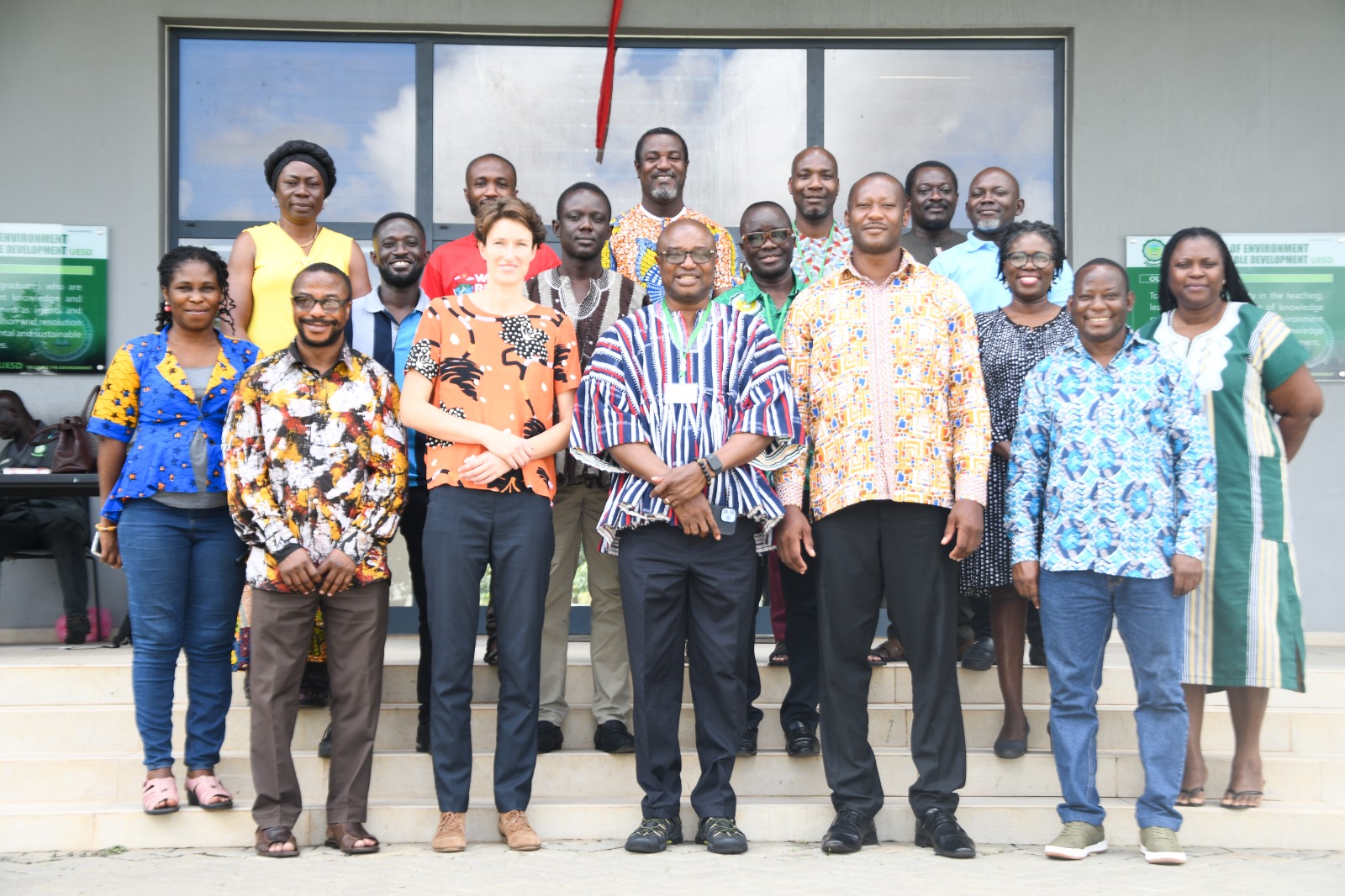The University of Environment and Sustainable Development (UESD), in collaboration with the Hochschule Bonn-Rhein-Sieg University of Applied Sciences, Germany held a two-day workshop from 9th to 10th October 2024; aimed at launching the implementation of the E-Certificate course on Sustainable Land Management. The initiative falls under the INTERFACES project, which focuses on providing innovative solutions for sustainable land use and addressing environmental challenges in sub-Saharan Africa.
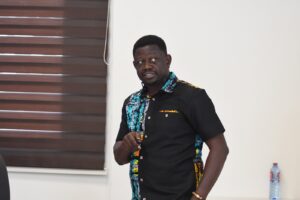
The workshop brought together key stakeholders, including faculty members from UESD and representatives from Hochschule Bonn-Rhein-Sieg’s International Centre for Sustainable Development (IZNE). It aimed to offer an extracurricular qualification for students, researchers, and professionals in land management practices, with special emphasis on addressing real-world environmental and agricultural issues through research and innovation.
The E-Certificate course, is divided into six instructional modules., These modules cover critical topics such as the evolution of Land Governance in Africa, led by Dr. Theodora Asiamah from UESD, which will provide insights into traditional land governance systems and the contemporary approaches to managing land resources in Africa.
Land Management and Governance in Rural Areas, discussed by Dr. Peter Asare-Nuamah, with focus on participatory land management and its impact on biodiversity and rural livelihoods.
Environmental Conservation and Climate Change, delivered by Prof. Edward Wiafe Debrah, highlighted the intersection of land management, ecosystem services, and climate resilience.
Gender in Land Management, touched on women’s contributions to sustainable land use and management. This module emphasized inclusive approaches to sustainable land management and would be led by Dr. Daniella Sedegah and Dr. Rosemary A. Anderson.
Spatial Household Data Collection: This process involves gathering geographic and household-level data to understand spatial patterns, typically for research in economics, land use, or public health. Prof. Anthony Amoah and Seyeram Loh led the discussion, likely using methods such as GIS (Geographic Information Systems) and surveys to map and analyze household characteristics.
Theory of Change: This approach maps out the steps required to achieve a particular long-term goal, identifying necessary interventions and outcomes. Prof. Anthony Amoah and Dr. Peter Asare-Nuamah spearheaded the discussion, focusing on creating a conceptual framework that explains how and why the desired change is expected to happen.
Inter- and Transdisciplinary Research for Sustainable Land Management in Africa: This type of research integrates knowledge from different disciplines and sectors, including local stakeholders, to create comprehensive solutions for sustainable land management. Dr. Eefje Aarnoudse and Dr. Felicia Annin led the talk, addressing complex land use challenges in Africa through collaborative and inclusive research approaches.
Impacts of Rural Land Management and Governance on Biodiversity Conservation: This involves studying how rural land practices and policies affect biodiversity. Dr. Nathaniel Annorbah led the effort, likely examining ways in which land use and governance frameworks can support or hinder biodiversity conservation efforts.
Participatory Land Management and Governance: This research focuses on involving local communities and stakeholders in the decision-making processes for land management and governance. Dr. Peter Asare-Nuamah led the talk, promoting more inclusive and equitable management practices that consider the needs and knowledge of all stakeholders involved.
The resource person from Hochschule Bonn-Rhein-Sieg, Dr. Eefje Aarnoudse provided an overview of the roadmap for the course implementation. The course will be available online, utilizing modern tools like Miro, Zoom, and Mentimeter to facilitate interactive learning sessions. Participants will engage in self-paced learning with synchronous moderated discussions at the end of each module (ELearning-Certificate_U) (INTERFACES_OnlineModera).
This initiative reflects the commitment of both Universities to promote sustainable land management through practical and research-driven approaches.
The Vice-Chancellor of UESD, Prof. Eric Nyarko-Sampson welcomed participants, emphasising the importance of the workshop in advancing land management, climate resilience, and sustainability in Ghana and beyond. He noted that the E-Certificate course is designed to equip students, researchers, and professionals with the knowledge and skills to address land degradation and sustainability challenges through an innovative and flexible learning platform.
The workshop provided participants with insights into key issues surrounding land management, environmental conservation, and inclusive strategies for sustainable development.
It was marked by significant highlights and discussions. According to the agenda, key moments of the event included a celebrative moment for the signing of a Memorandum of Understanding (MoU) between UESD and H-BRS. It formalized the partnership between the institutions and underscored the importance of collaboration in advancing education and sustainable land management practices across Ghana and beyond.
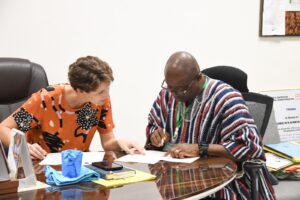
Day one featured a discussion on the collaboration between UESD, the West African Science Service Centre on Climate Change and Adapted Land Use (WASCAL), and the University for Development Studies (UDS) through their Water, Sanitation and Clean Water Institute for Sustainable Agriculture (WACWISA). The conversations aimed at exploring synergies and joint projects in sustainable land and water management. This was followed by a campus tour, giving participants insight into UESD’s state-of-the-art facilities. The UDS team was led by Professor Felix K. Abagale.
Day two kicked off with a welcome and introduction of participants by Prof. Edward Wiafe Debrah, which was followed by an update on the progress of the e-certificate by Eefje Aarnoudse from H-BRS. A highlight of the day was a session introducing participants to online moderation techniques and activation methods, vital for running the e-learning course effectively. Participants also collaboratively planned the online moderated sessions, detailing the tasks for moderators and identifying module coordinators, under the moderation of Eefje Aarnoudse.
Further, an important session led by FARA introduced participants to the Learning Management System (Moodle), which would be utilized for delivering the e-certificate course.
In his closing address, the Vice-Chancellor, Prof. Nyarko-Sampson, commended the participants for their active engagement and encouraged them to apply the knowledge and strategies they had gained to their various professional and academic fields. He also expressed his confidence in the E-Certificate course as a crucial tool for tackling land degradation, climate change, and related challenges.
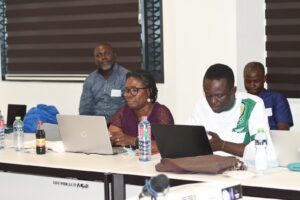
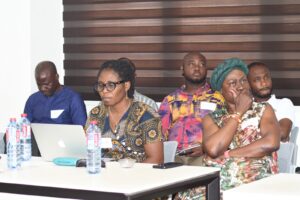
The Vice-Chancellor also acknowledged the tireless efforts of the organizers and commended them for their dedication to making the workshop a success. He reiterated the commitment of UESD to fostering sustainable development through education and collaborative initiatives.
The workshop concluded with participants leaving with a renewed sense of purpose and a commitment to applying the skills and knowledge acquired to advance sustainable land management practices in their respective communities and institutions.
They also felt empowered to embark on the next phase of the e-certificate course implementation, which is set to enhance capacity building in sustainable land management across sub-Saharan Africa.

